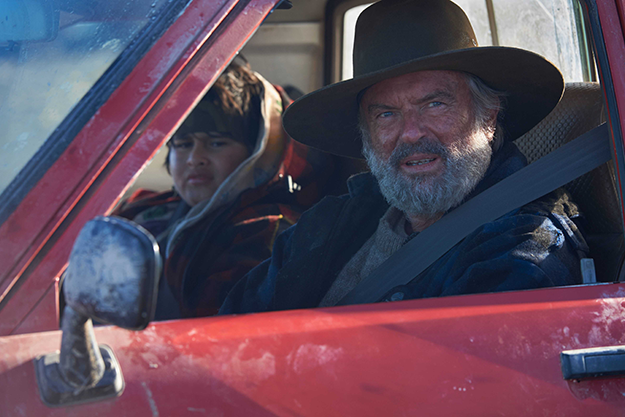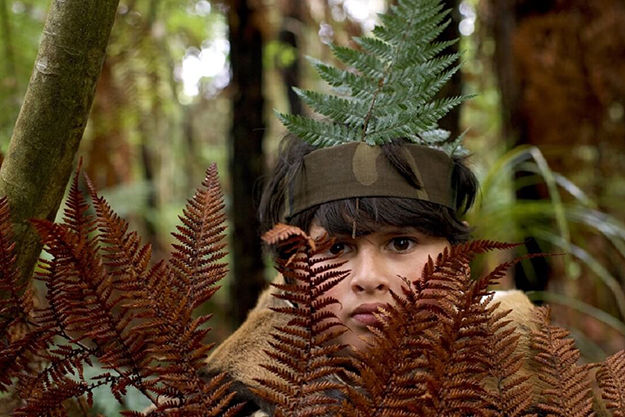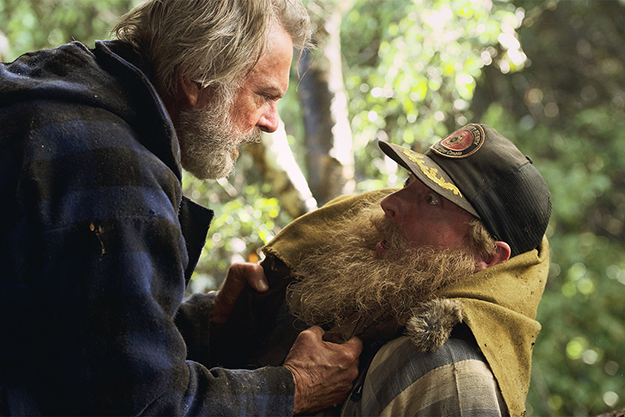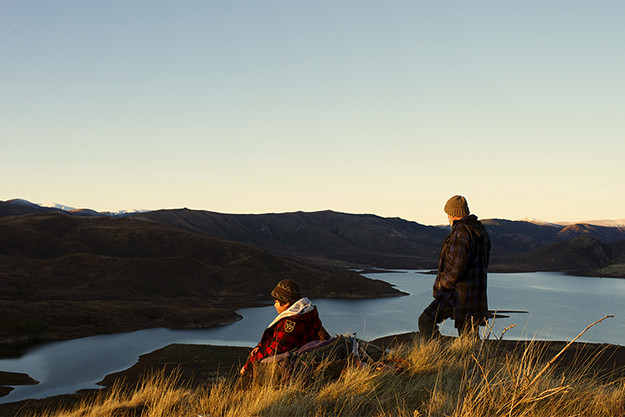Deep Focus: Hunt for the Wilderpeople
Familiarity breeds affection between an out-of-control 13-year-old Maori boy and a crusty old white bush hand—and between the movie and the audience—in Taika Waititi’s Hunt for the Wilderpeople, a rambunctious, beguiling comedy adventure about fugitives on the run in the New Zealand wilderness. Julian Dennison as Ricky Baker, the roly-poly problem child from foster care, and Sam Neill as Hec Faulkner, the illiterate loner with tip-top survival skills, generate a rare prickly warmth. As their director deftly navigates every step on the dramatic spectrum from farce to tragedy, Dennison and Neill cannily convey the mutual appreciation of characters who don’t how to please or even understand each other.
Waititi, as director and writer (he adapted Barry Crump’s novel Wild Pork and Watercress), maintains his story’s zip by keeping his two leads off-balance. In an offhand manner typical of their haywire relationship, Hec tells Ricky that the farm dog’s name is Zag—and the boy suggests that Hec get another dog and call it Zig. Then Ricky gets his own dog for his birthday and dubs it “Tupac.” Ricky has acquired a hip-hop vocabulary, some pop psychology, and even more pop culture while ricocheting from one foster home to the next, picking up demerits from Child Welfare for the petty thievery and vandalism he’s committed along the way. Hec is a Kiwi version of the strong silent type, clinging to an ideal of stoicism and self-sufficiency.
Early on, Hec’s wife Bella (the remarkably robust Rima Te Wiata) pierces Ricky’s hard shell with her compassion, practicality, and gusto. He loves that she provides his bed with a hot-water bottle. She lets him “run away” every night, knowing he will get as far as some steep hills nearby and be back for breakfast. Bella dominates the film’s first 20 minutes, whether she’s demonstrating how she outfitted her old sewing/guest room with toy animals and books for Ricky (the amusing mix of titles range from Animal Farm to Errol Flynn’s My Wicked, Wicked Ways) or flaunting her bloody knife as she slaughters a wild pig. All that time, Hec keeps his distance. In an unlettered man’s flash of native wit, he wonders whether Ricky is going to be a useful farm hand or merely remain “ornamental.”
When an unexpected calamity causes Child Welfare to declare that they will take Ricky back into custody (which to him means one place: “juvie”), the boy goes on the lam for nearly the rest of the movie. But Hec doesn’t abandon him. He finds Ricky and prepares to lead him out of the bush. Then they argue over whether “reading is stupid” (as Hec says) or Hec is stupid (as Ricky strongly implies). Their discussion grows so heated that Hec stops watching his step and breaks his ankle. It’s the perfect pivot for the movie, and not just because it yokes the two heroes together: it underlines the movie’s belief in literacy as the start of personal liberation and renewal. Hec mocks Ricky’s habit of concocting haikus to express emotions. (At one point, Ricky uses the au courant word “processing” to describe how he absorbs difficult experiences.) But Hec is moved when Ricky includes his name in the boy’s funky stabs at poetry. The title of the film is based on one of Ricky’s wordplays: After reading that migrating wildebeests travel a thousand miles, he reckons that he and Hec are “wilderpeople.” Near the end, we first guess how much Hec has changed when we see and hear him sounding out the words in a well-worn science fiction paperback.
Waititi’s triumph as a writer-director is to make Hec’s path to that moment play as a sprightly picaresque. The movie boasts a wry cast of supporting characters, such as the Child Welfare officer Paula (the formidable Paula House), who stalks Ricky like a comic version of Inspector Javert. She takes as her motto “No child left behind,” though no one can figure out what it means in that context. Waititi himself is hilarious as an inept minister who considers it inspirational to describe his flock as “sheep trapped in a maze designed by wolves.” With authority figures like these, why wouldn’t someone like Hec mistrust language?
As Hec and Ricky follow a route that’s almost as forbidding as The Revenant’s, they meet up with rugged and antic individuals. Tioreore Ngatai-Melbourne is charming as a girl who chatters more than Ricky and sings as sweetly as a bellbird, and Rhys Darby is brilliant as “Psycho Sam,” who has lived by himself in the bush for 15 years. Darby imbues Sam with the addled, ragtag charm of mad, marooned Ben Gunn in Treasure Island. He’s wiry and electric, continually reenergizing himself with his obsessions, whether he’s adorning Hec’s and Ricky’s heads (and his own) with tin colanders to keep their brains free from infiltration or depicting the Earth outside the bush as a globe full of “form-fillers.” With good reason, Hec worries about Ricky’s detachment from reality: the boy segues effortlessly from gangsta fantasy to the illusion that he and Hec are glorious Western outlaws. Psycho Sam provides an indelible picture of what lunacy actually looks like.
What We Do in the Shadows (14), Waititi’s biggest previous hit (he co-wrote and co-directed it with Jemaine Clement, and also played a dandified vampire), won over international audiences with its verité-style lampoon of post-Dracula culture from Nosferatu to Twilight. This Mad magazine-type romp was truly “humor in a jugular vein,” mixing a slice of undead life with a parody of the perils of house-sharing. Waititi nuanced the comedy, but the visual attack of that film was simply mockumentary spiked with special effects. Waititi exploited the visual humor of fly-on-the-wall cameramen capturing antiheroes flying through the air and drinking gushers of blood.
Hunt for the Wilderpeople, though, is vastly more sophisticated. We know we’re in good hands from the opening moments, when the New Zealand greenery undulates across the screen while an otherworldly choral chant fills the soundtrack. Even Child Welfare’s Paula seems to tap her pen in counterpoint to the music. The whole movie has an eccentric rhythm because this director is confident enough to let scenes sit and breathe before accelerating his narrative with peppy deadpan montages. In one charged sequence, timed to Leonard Cohen’s “Song of the French Partisan,” Waititi unfolds the action in the cinematic equivalent of a mural. Via some optical and/or digital wizardry, the camera doesn’t stop moving from left to right as we see Hec, Ricky, and Tupac disappear into the snowy forest while bounty hunters, cops, and guardsmen trail them and Paula huffs and scowls eloquently, at different times and without a cut. It’s startling when the paths of heavily armed lawmen and Paula intersect. It’s as if time and space have merged kinetically.
Waititi mostly directs like an orchestra conductor, merging all the audiovisual elements for a smashing effect. But he displays an unerring sensitivity when Ricky stumbles on a heartbreaking discovery at the farm; the camera never moves closer than a medium shot as Ricky listens to Hec’s howl of grief.
Waititi’s handling of his actors is beyond reproach. Neill sustains a gruff timbre throughout, and the only hint we get of his James Mason-like gentleness comes near the end, when Ricky demands to call Hec uncle, and Hec thoughtfully repeats, “Uncle.” Dennison takes Ricky’s aggressiveness to the edge of irritation. Their moment of rapprochement is just right: Ricky claps Hec into a hug, and Hec abashedly pats him on the shoulder. By then, Hec has crowned the movie with his own first haiku: “Me and this fat kid / we ran, we ate and read books / and it was the best.”
Michael Sragow is a contributing editor to FILM COMMENT and writes its Deep Focus column. He is a member of the National Society of Film Critics and the Los Angeles Film Critics Association. He also curates “The Moviegoer” at the Library of America website.











